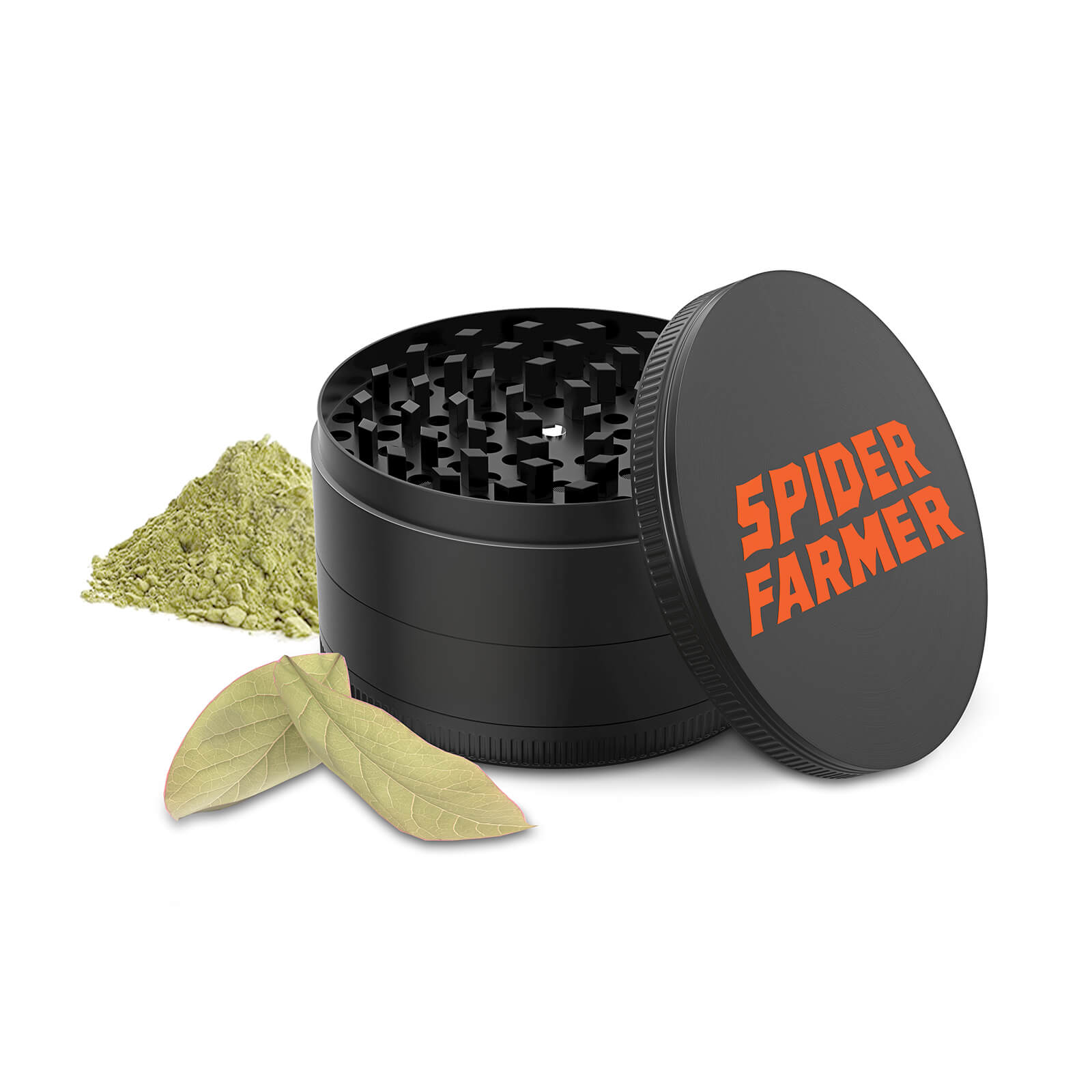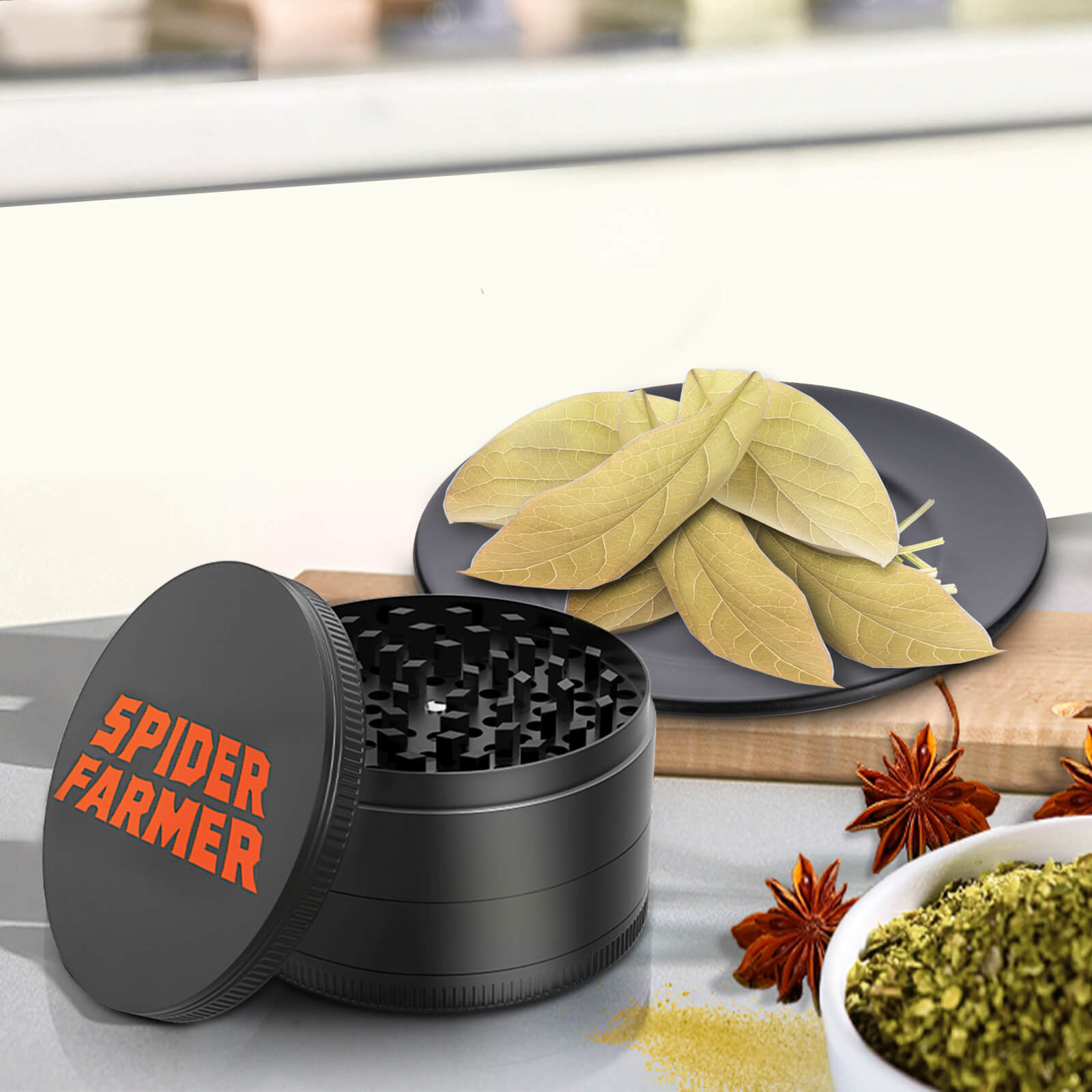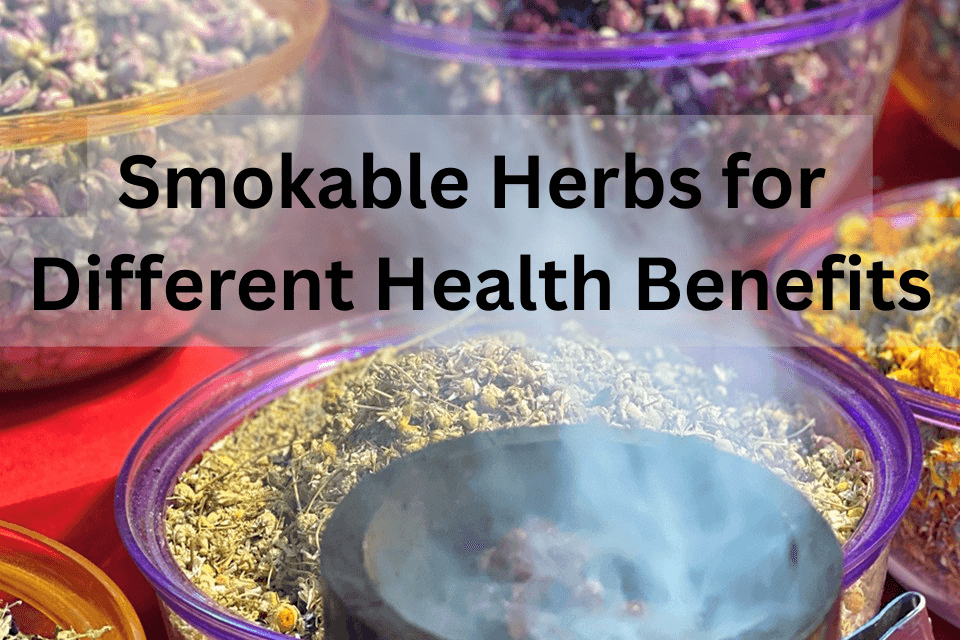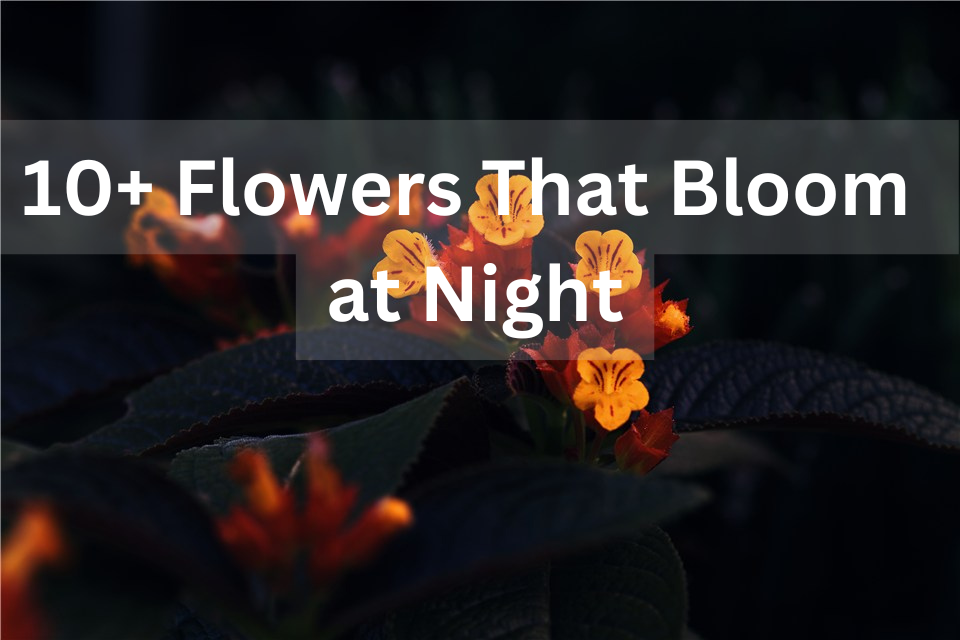Recently, smokable herbs have gained increasing attention for their potential therapeutic and recreational benefits. These natural plant materials are often dried and used in various forms, such as pipes rolled into joints, providing a wide range of effects that can enhance physical and mental well-being.
From promoting relaxation and reducing stress to providing respiratory support and enhancing mental clarity, smokable herbs have been utilized for centuries in health preservation and traditional medicine.
In this article, we’ll explore several smokable herbs and their benefits, highlighting their traditional uses, scientific backing, and herbal smoking mixtures recipes. Whether seeking relief from anxiety, looking to soothe respiratory issues, or aiming to improve overall health, you can get useful information from this post.
Table of Contents
What Is a Smokable Herb?
A smokable herb refers to a type of dried plant material that can be smoked. You can either smoke it alone or make a combination with other herbs. These smokable herbs are often used for various effects, ranging from relaxation and sedation to invigoration and focus.
Take mullein leaf as an example: it can soothe your lungs and reduce inflammation. Herbs, like damiana, are known for their mild psychoactive properties that can induce relaxation, while others, such as peppermint, provide a refreshing and invigorating experience.
You can use smokable herbs in pipes, roll them into joints, or incorporate them into herbal blends to create a different smoking experience.
What Are the Benefits of Smokable Herbs?
From promoting relaxation and reducing stress to providing respiratory support and enhancing mental clarity, smokable herbs have been utilized for centuries in traditional medicine and holistic practices.
In this part, we’ll delve into the diverse benefits of smokable herbs, highlighting their traditional uses and effects.
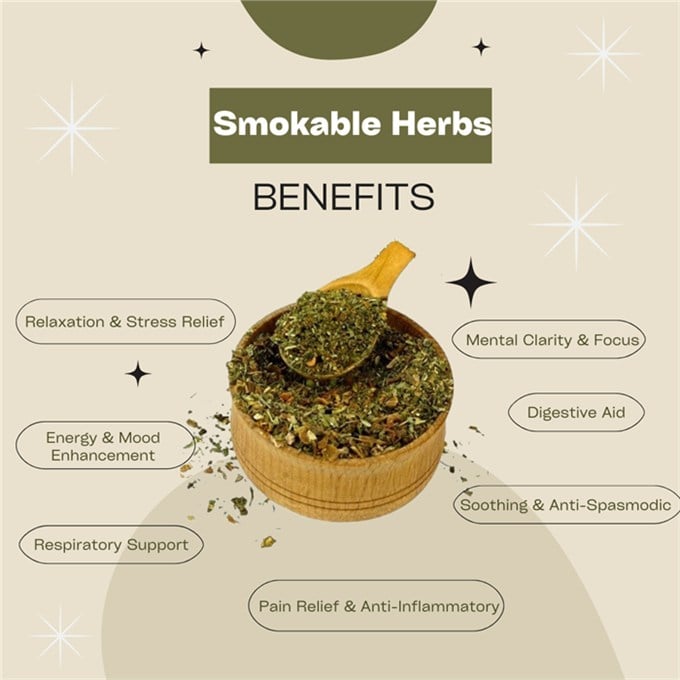
Benefits of Smokable Herbs
- Relaxation and Stress Relief
- Pain Relief and Anti-Inflammatory
- Energy and Mood Enhancement
- Respiratory Support
- Mental Clarity and Focus
- Digestive Aid
- Soothing and Anti-Spasmodic Effects
What Herbs Can You Smoke?
In this post, we’ll demonstrate a list of herbs that are safe to smoke. We’ll further explore what to smoke to calm anxiety, promote energy, and benefit your health.
Relaxation and Stress Relief
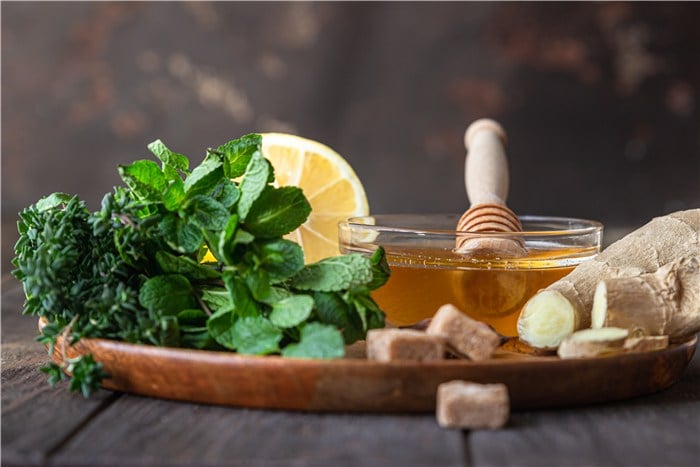
Smoke Herbs - Lemon Balm
- Lavender: It’s an effective natural remedy for stress relief. Its soothing scent has been shown to reduce anxiety and improve mood. Usually, you can use lavender in essential oils, teas, and bath products. Besides, lavender can enhance sleep quality and overall well-being.
- Chamomile: As Chamomile consists of apigenin, a bioactive compound that interacts with GABA-A receptors in the brain, it has a calming effect. Studies have also shown that regular consumption of chamomile tea can significantly reduce anxiety levels and improve overall psychological well-being.
- Lemon Balm (Melissa officinalis): Lemon balm has a light, lemony scent and a calming influence. It is known to alleviate stress and boost cognitive function by modulating mood and enhancing mental clarity.
- Passionflower (Passiflora incarnata): Passionflower is an effective remedy for stress and insomnia. It helps increase gamma-aminobutyric acid (GABA) in the brain, reducing overactivity and calming the mind.
- Holy Basil (Ocimum sanctum): Holy Basil is also known as tulsi. Often, it’s used to combat stress and enhance overall well-being.
Energy and Mood Enhancement

Smoke Herbs - Rosemary
- Peppermint: Peppermint is known for its invigorating aroma, which can boost energy and alertness. It stimulates the senses and increases oxygen flow to the brain, improving brain function and reducing fatigue. Peppermint essential oil can be used for aromatherapy or added to teas for a quick pick-me-up.
- Rosemary: Rosemary can enhance memory and concentration. It increases blood flow to the brain and supports neurotransmitter function, which can improve brain function and reduce fatigue. You can use rosemary as an essential oil for cooking.
- Yerba Mate: Yerba mate is a South American herb. It contains caffeine, theobromine, and theophylline, so it can be used for enhancing energy. Also, studies have shown that yerba mate can improve mental focus and increase physical endurance. You can often consume yerba mate as a tea. Compared to coffee, yerba mate provides a more gradual energy.
- Maca: Maca is a root vegetable. It’s known for increasing stamina and endurance. It supports the adrenal glands and balances hormones, which can improve energy levels and mental clarity. Maca is often used in powder form and can be added to smoothies or other foods for an energy boost.
- Rhodiola: Rhodiola contains active compounds like rosavin and salidroside, so it is used to combat fatigue and enhance improve performance. Some research also suggests that Rhodiola can enhance physical endurance and resilience to stress
Pain Relief and Anti-Inflammatory Effects

Smoke Herbs - Sage
- Ginger: Ginger is effective for nausea and possesses significant anti-inflammatory and analgesic properties useful for osteoarthritis, muscle soreness after exercise, and menstrual cramps. It contains active compounds like gingerols and shogaols that inhibit COX and LOX enzymes, reducing inflammatory prostaglandin production. Ginger can be used in fresh or dried root form for tea or cooking, capsules, tinctures, extracts, or essential oil.
- Clove: Clove oil contains eugenol, a potent natural analgesic and antiseptic, traditionally applied for toothache relief. It provides temporary numbing but should be used with caution as undiluted oil can irritate tissues.
- Sage: Improves cognitive function and memory, has anti-inflammatory properties.
- Feverfew: Feverfew is primarily used for the prevention of migraine headaches and may have broader anti-inflammatory effects. It contains parthenolide, a sesquiterpene lactone believed to inhibit prostaglandin synthesis and reduce serotonin release from platelets.
- Coltsfoot Leaf: Coltsfoot contents of bioactive compounds such as flavonoids, sesquiterpenes, and mucilage. These components work synergistically to reduce inflammation and soothe irritated tissues. In terms of this, it’s effective for conditions like bronchitis, asthma, and joint pain.
- Comfrey: Comfrey contains allantoin (promotes cell growth) and rosmarinic acid (anti-inflammatory) and is studied for osteoarthritis, back pain, and sprains/strains. It is used topically in creams or salves made from the root or leaf. Internal use is strongly discouraged due to potentially toxic pyrrolizidine alkaloids (PAs), which can cause liver damage.
- Turmeric (Curcumin): Effective anti-inflammatory and antioxidant properties that support overall brain health.
Respiratory Support

Smoke Herbs - Marshmallow Leaf
- Marshmallow Leaf: The leaf contains mucilage, a gel-like substance that coats and soothes the mucous membranes of the respiratory tract, reducing irritation and inflammation. This makes it effective for alleviating symptoms of coughs, bronchitis, and other respiratory conditions.
- Eucalyptus Leaf: Eucalyptus leaf is beneficial for respiratory support primarily due to its active compound eucalyptol (1,8-cineole), which acts as a natural expectorant and decongestant, helping to break down mucus and clear the airways. Additionally, eucalyptus leaf has anti-inflammatory and antimicrobial properties that help reduce inflammation in the respiratory tract and fight off infections, making it an effective remedy for conditions like bronchitis, sinusitis, and asthma.
Mental Clarity and Focus
- Ginkgo Biloba: Ginkgo Biloba is widely recognized for its ability to improve memory and cognitive speed. It works by increasing cerebral blood flow and oxygenation, which enhances mental clarity and focus. Ginkgo Biloba is often used in supplement form, but it can also be consumed as a tea.
- Gotu Kola: Gotu Kola is traditionally used for memory support and is known to sharpen mental clarity and ease anxious feelings. It contains active compounds that may enhance cognitive function and reduce stress.
Digestive Aid
- Fennel: Fennel is a relaxing and nourishing herb for the stomach and intestinal walls, particularly beneficial for reducing excessive gas and associated pain. As an antispasmodic, it helps relax contracted intestinal muscles, allowing trapped gas to disperse. Fennel also has antimicrobial properties that can help maintain a healthy bacterial balance in the gastrointestinal tract.
- Marshmallow Root: Marshmallow root is rich in mucilage polysaccharides, which provide soothing properties for the gastrointestinal tract. It can help reduce inflammation and support intestinal health. You can smoke marshmallow root or consume it in powdered or encapsulated form to ease digestive discomfort.
Soothing and Anti-Spasmodic Effects
- Damiana: This herb contains flavonoids and other compounds that can help alleviate gastrointestinal discomfort and spasms. It’s ideal for relaxing smooth muscles and reducing muscle spasms.
- Skullcap: Skullcap is an ideal smokable herb for soothing and anti-spasmodic effects due to its content of scutellarian, a compound with mild sedative and antispasmodic properties. It also contains flavonoids, sesquiterpenes, tannins, and essential oils, which collectively contribute to its calming and muscle-relaxing actions.
Herbal Smoking Mixtures Recipes
By the end of the post, we’ll offer some popular herbal smoking mixtures recipes. By mixing the mentioned smokable herbs, you can greatly enhance the effects of each material.
Smoking Blend For Stress
Ingredients:
- Raspberry – 3 parts
- Gotu Kola – 1 part
- Skullcap – 2 parts
- Linden Flower – 1 part
- Damiana – 2 parts
Instructions:
- Measure out the specified amounts of each herb.
- Combine all the herbs in a mixing bowl.
- Mix the herbs thoroughly until they are evenly distributed.
- Transfer the blend to an airtight container for storage.
Herbal Smoking Blend For Pain
Ingredients:
- Hemp – 5 parts
- Marijuana – 2 parts (optional, can be replaced with more hemp for a non-psychoactive blend)
- Blue Lotus Flower – 2 parts
- Blue Vervain – 3 parts
- Cinnamon (Powder) – 1 part
- Ginger (Ground Root) – 1 part
Instructions:
- Weigh out the specified amounts of each herb.
- Add all the herbs to a mixing container.
- Mix the herbs well to ensure they are evenly combined.
- Store the blend in a cool, dry, and dark location to preserve its potency.
Herbal Smoking Blend For Relaxation
Ingredients:
- Mullein Leaf – 3 parts
- Damiana Leaf – 5 parts
- Lavender – 2 parts
- Chamomile – 2 parts
Instructions:
- Weigh out the proportions of each herb.
- Add everything to a ziplock bag or glass jar, leaving a little bit of room at the top.
- Seal the container and give it a really good shake until everything is evenly mixed.
- Store the blend in an airtight container somewhere under bright indirect light and away from any heat sources.
Citrusy Mint Fusion
Ingredients:
- Lemon Balm – 2 tablespoons
- Red Raspberry Leaf – 1 tablespoon
- Chocolate Mint – 1/2 tablespoon
Instructions:
- Weigh out the specified amounts of each herb.
- Add the herbs to a mixing container.
- Mix the herbs thoroughly.
- Transfer the blend to a storage container with a tight-fitting lid.
Soothing Floral Blend
Ingredients:
- Marshmallow Leaf – 2 tablespoons
- Blue Lotus – 1 tablespoon
- Rose Petals – 1/2 tablespoon
Instructions:
- Measure out the specified amounts of each herb.
- Combine the herbs in a bowl.
- Mix the herbs until well-blended.
- Store the blend in an airtight container.
Conclusion
In conclusion, smokable herbs offer a diverse range of benefits, from relaxation and stress relief to pain relief, mental clarity, and digestive support. Each herb brings unique properties that can enhance overall well-being when used responsibly. Whether you are seeking to unwind after a long day, improve cognitive function, or soothe digestive discomfort, there is an herb or smoking mixtures recipe that can meet your needs.

























